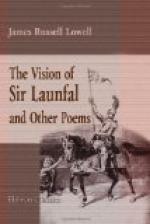This, of course, is but a half serious portrait of himself, and it touches but a single feature; others can say better that Lowell’s ardent nature showed itself in the series of satirical poems which made him famous, The Biglow Papers, written in a spirit of indignation and fine scorn, when the Mexican War was causing many Americans to blush with shame at the use of the country by a class for its own ignoble ends. Lowell and his wife, who brought a fervid anti-slavery temper as part of her marriage portion, were both contributors to the Liberty Bell; and Lowell was a frequent contributor to the Anti-Slavery Standard, and was, indeed, for a while a corresponding editor. In June, 1846, there appeared one day in the Boston Courier a letter from Mr. Ezekiel Biglow of Jaalam to the editor, Hon. Joseph T. Buckingham, inclosing a poem of his son, Mr. Hosea Biglow. It was no new thing to seek to arrest the public attention with the vernacular applied to public affairs. Major Jack Downing and Sam Slick had been notable examples, and they had many imitators; but the reader who laughed over the racy narrative of the unlettered Ezekiel, and then took up Hosea’s poem and caught the gust of Yankee wrath and humor blown fresh in his face, knew that he was in at the appearance of something new in American literature. The force which Lowell displayed in these satires made his book at once a powerful ally of an anti-slavery sentiment, which heretofore had been ridiculed.
IV.
VERSE AND PROSE.
A year in Europe, 1851-1852, with his wife, whose health was then precarious, stimulated his scholarly interests, and gave substance to his study of Dante and Italian literature. In October, 1853, his wife died; she had borne him three children: the first-born, Blanche, died in infancy; the second, Walter, also died young; the third, a daughter, Mrs. Burnett, survived her parents. In 1855 he was chosen successor to Longfellow as Smith Professor of the French and Spanish Languages and Literature, and Professor of Belles Lettres in Harvard College. He spent two years in Europe in further preparation for the duties of his office, and in 1857 was again established in Cambridge, and installed in his academic chair. He married, also, at this time Miss Frances Dunlap, of Portland, Maine.
Lowell was now in his thirty-ninth year. As a scholar, in his professional work, he had acquired a versatile knowledge of the Romance languages, and was an adept in old French and Provencal poetry; he had given a course of twelve lectures on English poetry before the Lowell Institute in Boston, which had made a strong impression on the community, and his work on the series of British Poets in connection with Professor Child, especially his biographical sketch of Keats, had been recognized as of a high order. In poetry he had published the volumes already mentioned.




